
Publisher:
Bonnie King
CONTACT:
Newsroom@Salem-news.com
Advertising:
Adsales@Salem-news.com

~Truth~
~Justice~
~Peace~
TJP
Sep-03-2012 14:38

 TweetFollow @OregonNews
TweetFollow @OregonNews
Implementing the Feltman Project...
Is the Syrian Crisis Being Leveraged to Weaken Hezbollah?
Dr. Franklin Lamb Salem-News.com
Increasing threats of violence in Lebanon and Syria, appear designed to peel away support from Hezbollah and to ignite more sectarian conflict in Lebanon.
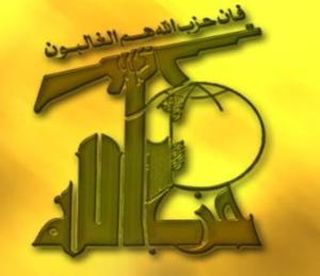 Photos: Uprooted Palestinians and other sources |
(BEIRUT Counterpunch) - One would be correct in imagining that life’s no bowl of cherries for Hezbollah these days.
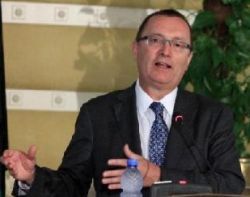 From Franklin Lamb's: Bullying Hezbollah... |
Pressures, often intense, resulting in being sucked into the vortex of the powerful maelstrom and violent whirlpool of Lebanese and regional politics can’t be bringing much pleasure to Lebanon’s National Resistance led by Hezbollah and that includes this observers Dahiyeh neighborhood.
Following their one on one meeting last weekend, US secretary of state Clinton and Turkish Prime Minister Erdogon Hezbollah are seeking to intensify pressure on both Hezbollah and Syria. One project is reported to be US instructions to their March 14 allies to force a vote in Lebanon’s Parliament allowing the deployment of international troops along Lebanon’s northern border with Syria.
Some March 14 politicians have been publically calling for the deployment of an international force positioned along the poorly demarcated border between Lebanon and Syria. These US-Saudi supported forces have also revived the Welch Club-Jeffrey Feltman project first floated in 2007 at Israel’s request following its defeat during the 33 day July war.

Hezbollah’s internal and external opponents are reportedly seeking a quick “modernizing” of the current airport at Kleiat near Sunni Akkar close to Tripoli in North Lebanon. According to one Member of Parliament, “The Americans and some internal sides had already “dusted off” the file of the revival of the Sunni Kleiat Airport.” One of its intended uses is expected to house international troops and American forces for “training, storage and forward supply.”
The Feltman idea, which was publicly exposed four years ago, now envisages a “liberated geographic zone” to pressure Syria and others with a base for military operations in the region, never died. It was rather put in storage pending future opportunity. With the Syrian chaos and crisis the sought opportunity may have arrived with Pentagon analysts and American allies agreeing with Clinton and Erdagon that the time for a regional Kleit airbase is now. It may be recalled that in 2008, an American military delegation examined the Kleiat runway “for logistic purposes pertaining to cooperation with the Lebanese Army” according to US Embassy Beirut. During Congressional testimony, the Pentagon told Congress that “the current runway at Kleiat is perfectly suitable for planes transporting military equipment. But it does not have the necessary qualifications to be a civil airport.” Few political analysts here doubt that such a project would vigorously opposed by the Lebanese National Resistance. Hezbollah official Sheikh Naim Qassem has condemned such moves “as a method to destroy the country.” He stated last week that:
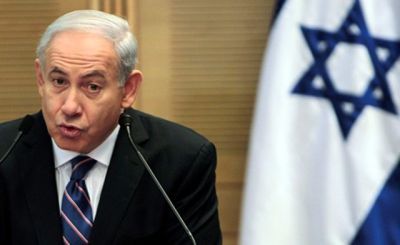 Israel's Prime Minister Benjamin Netanyahu |
“Hezbollah refuses to allow Lebanon to intervene in Syrian affairs and categorically rejects the deployment of international forces to the northern borders. That is a Zionist project to destroy Lebanon in the same way as Syria. When they lost the ability to influence the Syrian equation, they began proposing suspect projects like deploying international forces to the north to support the buffer zone. If the March 14 group stops sabotaging Lebanon’s north with arms, smuggling and militia work, and stability would reign. They are responsible for tensions that hit our people in Tripoli, Akkar and the north in general.”
As though working in concert with the US and its sponsored groups in Lebanon, pressure from the colonial occupiers of Palestine to instill fear among Lebanese is reflected in the increased number of daily warplanes and reconnaissance planes violating this country’s airspaces, recently focusing also on Tripoli and the Kleiat airport area. This week’s incidents included flyovers in the south, east and north of Lebanon add to a total of more than 8000 Israeli violation of UNSCR 1701 while UNIFIL watches and takes notes from its base in Naquoria, near Tyre.
According to one UNIFIL source, Israel is also trying to tax Resistance forces in the south and force them into revealing some of their locations near Kfar Kila where Israel recently built another wall, as well as Resistance preparations for the coming Israel-Hezbollah war.
Targeted by Al-Qaeda and Its New Allies
 Majid bin Muhammad al Majid: leader of Al-Qaeda |
Increasing threats of violence against Hezbollah and Shiites by the Al-Qaeda affiliated Abdallah Azzam Brigades, active in Lebanon and Syria, appear designed to peel away support from Hezbollah and to ignite more sectarian conflict in Lebanon. One recent threat was posted on a jihadist website on 8/17/12 and is being broadcast here by the US-Saudi backed March 14 opposition. The audio recording warns Shiites that “the positions of Hezbollah and the Amal Movement vis-à-vis the Syrian revolution do not serve your best interests … If you maintain your arrogant attitude, you will be punished, and you will pay. You only have yourselves to blame.”
According to Dr. Ahmad Moussalli, political science professor at the American University of Beirut and an expert on political Islam: “This Al-Qaeda unit considers current conditions in Lebanon and Syria to be a golden opportunity to strike against targets that were far from their reach in the past. Looking at the border situation now, they can transfer militants from Syria to Lebanon in order to carry out attacks against Hezbollah and their supporters.”
These forces, increasingly seen as working with some elements in the March 14 grouping, are also trying to instill confusion in Hezbollah neighborhoods over understanding the Party’s role in the Syrian crisis given that Hezbollah officials support the popular uprisings of the Arab spring and Islamic awakening.
A Hezbollah source reports that the complicated environment here in Lebanon and the region are not easy ones given internal and external enemies. One friend acknowledges also the danger of Hezbollah as the leader of the international Resistance risks being viewed as simply a local Shia party which would be dangerous to the party and this country on multiple levels.
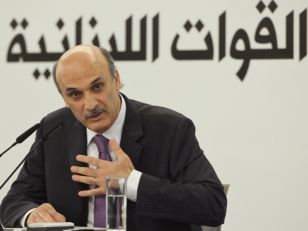 Lebanese Forces leader Samir Geagea |
Lebanese Forces leader Samir Geagea regularly repeats charges that “the March 8 alliance of being behind the deteriorating security situation in the country in order to create as many spots of tension as possible along with incidents to decrease pressure on the Syrian regime.” In a direct reference to Hezbollah, Geagea said “There are enormous strategic dangers that stem from the presence of a statelet within the state. The state has no authority over it because the owners of this statelet and their allies are paralyzing it.”
Geagea and his allies has also condemned Hezbollah for the “appalling silence” with which it met the abductions of Syrian and Arab nationals in Lebanon.[We condemn] Hezbollah’s appalling silence regarding these incidents that take place in its regions of influence, while its Secretary General Sayyed Hassan Nasrallah claims that things got out of hand without condemning these incidents. That means that he gives his total consent for these acts.”
According to Hanin Ghaddar writing in New York Times, “Something fundamental has changed: the Shiite militant group Hezbollah long Syria’s powerful proxy in Lebanon has become a wounded beast. And it is walking a very thin line between protecting its assets and aiding a crumbling regime next door.”
The March 14 Youth organizations, normally working within their individual parties have begun a combined efforts to confront elements of the Hezbollah led Resistance. Last week at the Universite Saint Joseph, hundreds of students from the Lebanese Forces (LF), the Future Movement, the Kataeb, al-Jamaa al-Islamiyah and the National Liberal Party (NLP) staged a rally ostensibly to call for the resignation of Foreign Minister Adnan Mansour and the expulsion of Syrian Ambassador Ali Abdel-Karim Ali, but also to attack Hezbollah.
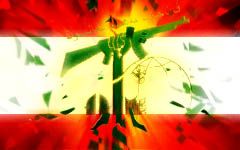
Since the surprise arrest of former Information Minister, Resistance and Al-Assad Michel Samaha on 8/9/12 , and the subsequent charging him along with Syrian National Security head General Ali Mamluk with plotting “terror attacks,” key pillars of government, including the President Suleiman and Prime Minister Miqati appear to be distancing themselves somewhat from the Assad regime. Rumors are circulating that within the Hezbollah leadership some are having private doubts about the party’s relationship with the Assad regime.
Hezbollah realizes that there is a need to create a balance, however delicate, between Lebanon’s national interest, primary of which is to be free of future Israeli occupation and Lebanon’s position in regional Arab causes. Presumably Hezbollah’s research center and other think tanks are reviewing earlier actions and in some cases will modify original stances to meet the changing realities in Lebanon and beyond.
The party and the Shite community are being advised of a need to continue advocating the politics of openness, dialogue, and partnership in order to preserve Lebanon.
There currently obtains in Lebanon, as next year’s crucial Parliamentary election approaches, an especially ugly political atmosphere prevailing with internal and external groups seeking to hold Hezbollah and the wider Shia community responsible for many current problems ranging from power cuts, security, public security, poor water quality, inflation and weak infrastructure. Some from my neighborhood have taken to the streets in the past few months to protect against the increasing power cuts.
The coming weeks will reveal what, if any, success foreign and domestic anti-Resistance forces achieve in using the Syrian crisis to dismantle Hezbollah.
 Dr. Franklin Lamb is Director of the Sabra Shatila Foundation. Contact him at: fplamb@sabrashatila.org. He is working with the Palestine Civil Rights Campaign in Lebanon on drafting legislation which, after 62 years, would, if adopted by Lebanon’s Cabinet and Parliament grant the right to work and to own a home to Lebanon’s Palestinian Refugees. One part of the PCRC legislative project is its online Petition which can be viewed and signed at: petitiononline.com/ssfpcrc/petition.html. Lamb is reachable at fplamb@palestinecivilrightscampaign.org.
Franklin Lamb’s book on the Sabra-Shatila Massacre, International Legal Responsibility for the Sabra-Shatila Massacre, now out of print, was published in 1983, following Janet’s death and was dedicated to Janet Lee Stevens. He was a witness before the Israeli Kahan Commission Inquiry, held at Hebrew University in Jerusalem in January 1983.
Dr. Franklin Lamb is Director of the Sabra Shatila Foundation. Contact him at: fplamb@sabrashatila.org. He is working with the Palestine Civil Rights Campaign in Lebanon on drafting legislation which, after 62 years, would, if adopted by Lebanon’s Cabinet and Parliament grant the right to work and to own a home to Lebanon’s Palestinian Refugees. One part of the PCRC legislative project is its online Petition which can be viewed and signed at: petitiononline.com/ssfpcrc/petition.html. Lamb is reachable at fplamb@palestinecivilrightscampaign.org.
Franklin Lamb’s book on the Sabra-Shatila Massacre, International Legal Responsibility for the Sabra-Shatila Massacre, now out of print, was published in 1983, following Janet’s death and was dedicated to Janet Lee Stevens. He was a witness before the Israeli Kahan Commission Inquiry, held at Hebrew University in Jerusalem in January 1983.
 |
 |
 |
 |
 |
 |
 |
Articles for September 2, 2012 | Articles for September 3, 2012 | Articles for September 4, 2012
Salem-News.com:



Quick Links
DINING
Willamette UniversityGoudy Commons Cafe
Dine on the Queen
Willamette Queen Sternwheeler
MUST SEE SALEM
Oregon Capitol ToursCapitol History Gateway
Willamette River Ride
Willamette Queen Sternwheeler
Historic Home Tours:
Deepwood Museum
The Bush House
Gaiety Hollow Garden
AUCTIONS - APPRAISALS
Auction Masters & AppraisalsCONSTRUCTION SERVICES
Roofing and ContractingSheridan, Ore.
ONLINE SHOPPING
Special Occasion DressesAdvertise with Salem-News
Contact:AdSales@Salem-News.com

Terms of Service | Privacy Policy
All comments and messages are approved by people and self promotional links or unacceptable comments are denied.
[Return to Top]
©2026 Salem-News.com. All opinions expressed in this article are those of the author and do not necessarily reflect those of Salem-News.com.